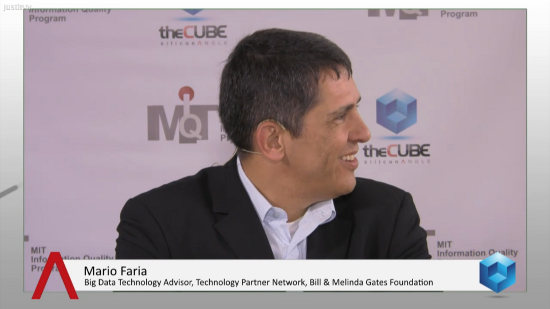 NEWS
NEWS
 NEWS
NEWS
 NEWS
NEWS
Mario Faria, Big Data Technology Advisor at Technology Partner Network, Bill & Melinda Gates Foundation, and part of the MIT Data Science Initiative, discussed the role of the Chief Data Office in enterprise, as well as that of the team they manage, with theCUBE co-hosts Dave Vellante and Jeff Kelly, live at the MIT CDOIQ Symposium.
![]()
The first CDO in Latin America during his time at Boa Vista, Mario Faria said he was more of a data practitioner than a data scientist. “I am not a data scientist per se, I am more downstream on the data process, I understand how to use and monetize in terms of data. I am a data practitioner. ”
Asked how an organization justifies the role of a CDO, Faria said that it’s a matter of common sense, as for most companies data has become a critical asset to creating value. “When you bring in a CFO, do you make a business case to bring your CFO?” The same is true for a adding a CDO position.
Remembering his first day on the job as CDO, Faria said he spent “the majority of the time talking to my peers, understanding their expectations, understanding how they saw data. I did more listening than any other action.” The purpose was to understand the issues, to later create a vision with his team, implement it in the future to address those very issues.
“You’re there to make money or save costs in an area where you have some inefficiencies,” Faria explained. “What my team did was look at issues we had to solve.”
Asked where should the CDO sit in the organizational structure, Faria said that in his case, as data was very important to the company, he was reporting directly to the CEO, the CIO being his peer. In other organizations, CDOs report to COOs or to Marketing.”I don’t think it’s a good idea to report to the CIO. Data should be a business issue, not a technical issue.”
Commenting on the concept of data quality, Faria said: “We have a saying, ‘ garbage in, garbage out.'” Quality should be ensured at every step of the data process, “otherwise you’ll hurt yourself down the line. It should evolve as part of data science, how you can look at raw data to create value for your business,” he explained.
Granularity plays a large role in data quality, he said, detailing his experience with Boa Vista. “We have to have quality down to every detail, we had to be really, really careful. when we applied data quality methodologies, we had to be even more paranoid,” given the particularities of a financial business, Faria explained.
Asked what piece of advice he’d share with CDOs to help them succeed, Faria said that “not every data person will be a CDO down the road.” There are a lot of skills needed to succeed, and know-how pertaining to communications, data, mathematics, statistic, while also being good with people, and tech savvy.
See the full interview below:
Support our mission to keep content open and free by engaging with theCUBE community. Join theCUBE’s Alumni Trust Network, where technology leaders connect, share intelligence and create opportunities.
Founded by tech visionaries John Furrier and Dave Vellante, SiliconANGLE Media has built a dynamic ecosystem of industry-leading digital media brands that reach 15+ million elite tech professionals. Our new proprietary theCUBE AI Video Cloud is breaking ground in audience interaction, leveraging theCUBEai.com neural network to help technology companies make data-driven decisions and stay at the forefront of industry conversations.